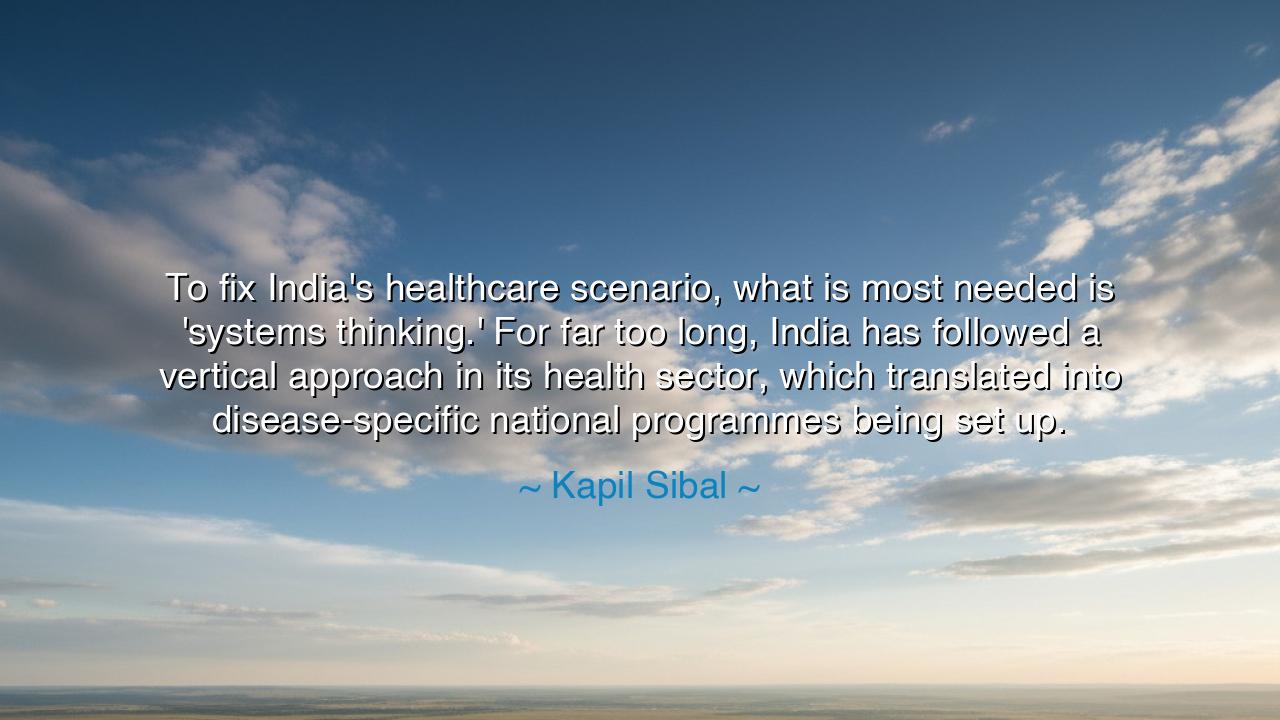
To fix India's healthcare scenario, what is most needed is
To fix India's healthcare scenario, what is most needed is 'systems thinking.' For far too long, India has followed a vertical approach in its health sector, which translated into disease-specific national programmes being set up.






In the great symphony of a nation’s progress, health is its rhythm—steady, vital, and eternal. When Kapil Sibal declared, “To fix India's healthcare scenario, what is most needed is 'systems thinking.' For far too long, India has followed a vertical approach in its health sector, which translated into disease-specific national programmes being set up,” he was not merely speaking as a statesman, but as a sage who perceived the deeper order hidden beneath chaos. His words ring with the wisdom of a healer who understands that no limb can thrive if the body itself is sick, and that no nation can stand strong if its people are treated as fragments rather than as one living system.
The meaning of his words lies in this eternal truth: that a system divided against itself cannot heal. For decades, India’s approach to health has been vertical—focused narrowly on the conquest of single diseases, like malaria, tuberculosis, or polio. These were noble battles, waged with passion and courage. Yet, as Sibal warns, the victory of one campaign cannot ensure the wellness of the whole. The human body itself teaches us this lesson. To cure the fever but ignore the hunger, to mend the wound but neglect the mind—these are triumphs that fade. Only when all the organs move in harmony, when every function supports the other, does life truly flourish.
The call for systems thinking is a call to wisdom—to see health not as isolated ailments, but as an intricate web woven of poverty, education, environment, nutrition, and governance. It is to see that the sickness of one part of society infects the rest. When clean water is scarce, disease grows; when education falters, prevention fails; when poverty reigns, medicine becomes a privilege. To think in systems is to understand that healing a nation requires not a thousand silos, but one vision—comprehensive, compassionate, and enduring.
History itself offers lessons in this truth. Consider the reign of Ashoka the Great, the emperor who turned from conquest to compassion. After the war of Kalinga, he did not merely decree peace—he built systems of welfare, planting trees for shade, digging wells for water, establishing hospitals for man and beast alike. He understood what many still forget: that the health of a kingdom is not measured by the number of soldiers who march, but by the number of citizens who thrive. His empire prospered not through division, but through unity of purpose. Such is the power of a systems mind—a vision that heals the whole rather than patching the parts.
Sibal’s message, then, is not bound by geography or time—it is a mirror held to every society. The vertical approach—the obsession with isolated problems—is not only a flaw in policy but a reflection of a deeper human error. We build walls between disciplines, institutions, and even hearts, believing we can solve one issue without touching another. But as rivers feed the ocean, so must every effort in education, sanitation, nutrition, and justice flow together if the people are to live in health. Systems thinking is not a strategy—it is a philosophy of wholeness.
And so, the lesson for the people and leaders alike is this: think not in fragments, but in networks; act not in isolation, but in connection. When you heal a child, remember the school she must attend. When you purify a stream, remember the farmer who depends upon it. When you strengthen hospitals, remember the roads, the water, the power, and the knowledge that sustain them. Every cure must be rooted in context, every reform in relation. The health of one is the destiny of all.
Therefore, let this truth be passed to future generations: a nation’s health is not a matter of medicine alone—it is the reflection of its soul. To heal India, or any land, is to weave together its scattered threads into a single tapestry of care. The systems thinker is the modern philosopher—one who sees the invisible connections between people, policy, and planet. Let us, then, rise as guardians of the whole, not fixers of the parts. For only when we think as one body, one people, one living system, shall the heartbeat of our nation find its rhythm again—and pulse forever with the strength of unity, compassion, and wisdom.






AAdministratorAdministrator
Welcome, honored guests. Please leave a comment, we will respond soon